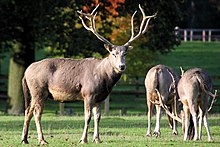Père David's deer
Père David's deer (Elaphurus davidianus) is a species of deer. It is also known as Milu (麋鹿) in Chinese. In the past it went extinct in the wild and existed only in captivity. However, it has been reintroduced to the wild in some areas. It likes marshland, and is believed to be native to the subtropics. It eats a mixture of grass and water plants.
| Père David's deer Temporal range: Late Pliocene to Holocene
| |
|---|---|

| |
| At Woburn Deer Park in Bedfordshire, England | |
| Scientific classification | |
| Domain: | Eukaryota |
| Kingdom: | Animalia |
| Phylum: | Chordata |
| Class: | Mammalia |
| Order: | Artiodactyla |
| Family: | Cervidae |
| Subfamily: | Cervinae |
| Genus: | Elaphurus A. Milne-Edwards, 1866 |
| Species: | E. davidianus
|
| Binomial name | |
| Elaphurus davidianus A. Milne-Edwards, 1866
| |
Characteristics
changeAdults weigh between 150 kg (331 lb) and 200 kg (441 lb). They have a nine-month gestation period, and one or two fawns are born at a time. They reach maturity at about 14 months, and have been known to reach the age of 23 years.
Père David's deer has a long tail, wide hooves, and branched antlers. Adults have summer coats that are bright red with a dark dorsal stripe, and dark gray winter coats. The fawns are spotted.
Population
changeThis species of deer is native to China.[2] By the late 19th century, the deer had become extinct in the wild. The only remaining herd belonged to the was Chinese emperor. He kept the deer in a royal hunting park in the southern part of Beijing.[3] In 1895, a flood washed away part of the wall and some of the deer escaped. Most of these were then killed and eaten by the local population. This left fewer than 30 deer left in the park. Then in 1900, the park was occupied by German and Japanese soldiers during the Boxer Rebellion. These killed and ate the remaining deer.[4] This left the deer nearly extinct in China.[5][6] The last known deer in the wild in China was shot in 1939 near the Yellow Sea.[4]
A few animals had been taken illegally to Europen countries to be put on show. In 1900, Herbrand Russell was determined to save the deer. He bought all that remained in captivity in Europe and brought them to Woburn Abbey, England.[7] The deer survived through both World Wars due to the efforts of Russell and his son, Hastings.[8] The current world population comes from this herd, and can be found in zoos around the world.[9][10]
The deer began to be reintroduced in the wild in 1985, with a herd of 20 deer. These were placed in Nan Haizi Milu Park, Beijing, and Dafeng Reserve, Jiangsu Province, China. Other herds were added in 1986 and 1987.[11] By 2005, the wild population had increased to about 2,000.[12][13]
References
change- ↑ Jiang, Z.; Harris, R.B. (2016). "Elaphurus davidianus". IUCN Red List of Threatened Species. 2016: e.T7121A22159785. Retrieved 29 March 2020.
- ↑ Huffman, Brent. "Pere David's deer, Milu". www.ultimateungulate.com.
- ↑ Twigger, R (2003). "Milu". The Extinction Club. New York: HarperCollins Publishers. pp. 56–61. ISBN 978-0060535964.
- ↑ 4.0 4.1 "Elapharus davidianus". Archived from the original (IUCN 2008 Redlist) on 2009-02-25. Retrieved 2009-02-07.
- ↑ Ley, Willy (1964). "The Rarest Animals". Galaxy Science Fiction. pp. 94–103.
- ↑ Jiang, Z.; Harris, R.B. (2016). "Elaphurus davidianus. The IUCN Red List of Threatened Species 2016: e.T7121A22159785". The IUCN Red List of Threatened Species. doi:10.2305/IUCN.UK.2016-2.RLTS.T7121A22159785.en.
- ↑ "Saving the Père David's Deer". World Wildlife Fund. Retrieved 17 June 2019.
- ↑ Miller, Matthew L. (23 September 2013). "Saved by Chance: The Incredibly Strange Story of the Pere David's Deer". Cool Green Science. Retrieved 17 June 2019.
- ↑ Goodall, J; Maynard, T; Hudson, G (2009). "Milu or Père David's Deer, China". Hope for Animals and their World: How Endangered Species are being Rescued from the Brink. New York: Grand Central Publishing. pp. 39–46. ISBN 978-0446581776.
- ↑ Barker, Danielle (15 October 2018). "Milu deer fighting its way out of extinction". USA TODAY. Retrieved 17 June 2019.
- ↑ Jiang, Zhigang; Yu, Changqing; Feng, Zuojian; Zhang, Linyuan; Xia, Jinshi; Ding, Yuhua; Lindsay, Nick (2000). "Reintroduction and Recovery of Père David's Deer in China". Wildlife Society Bulletin (1973-2006). 28 (3): 681–687. ISSN 0091-7648. JSTOR 3783620. Retrieved 17 June 2019.
- ↑ Père David's deer. britannica. 2012.
- ↑ Zeng, Yan; Jiang, Zhigang; Li, Chunwang (14 December 2006). "Genetic variability in relocated Père David's deer (Elaphurus davidianus) populations—Implications to reintroduction program". Conservation Genetics. 8 (5): 1051–1059. doi:10.1007/s10592-006-9256-0. S2CID 20041280.
Literature
change- Deer Specialist Group (19963). Elaphurus davidianus. 2006 IUCN Red List of Threatened Species. IUCN 2006. Retrieved on 06 May 2006. Listed as Critically Endangered (CR D v2.3)
- Robert Twigger, The Extinction Club (William Morrow, 2001). ISBN 0688175392 This is an account of the author's research into the Milu.
Other websites
change- Père David's Deer at Animal Diversity Web
- Père David's deer from ARKive
Facts Status Description Range Habitat Biology Threats Conservation Find out more Glossary References View all
